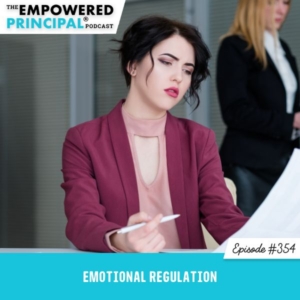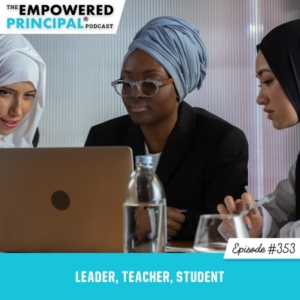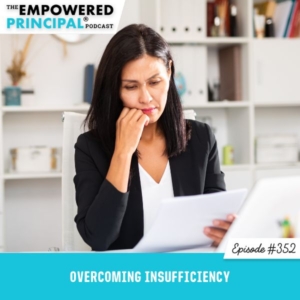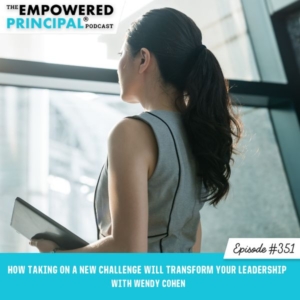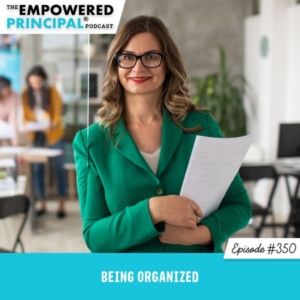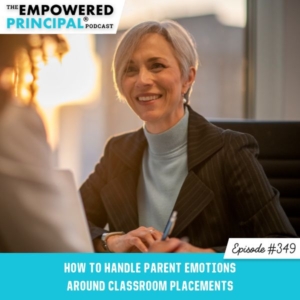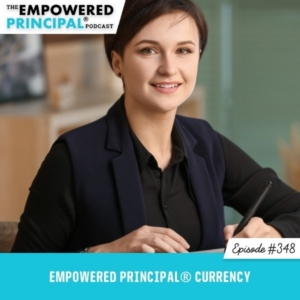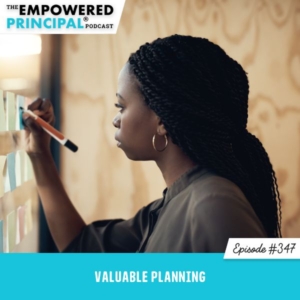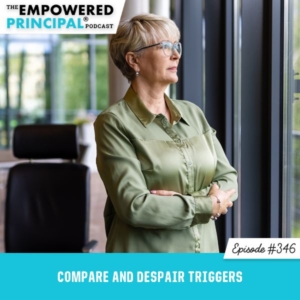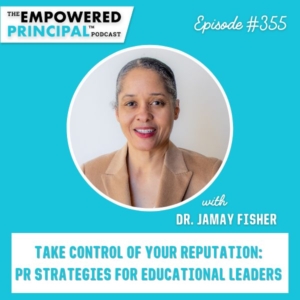
As educators who are committed to helping our communities grow and being leaders in our own space, it’s important for us to manage both our personal public image and that of our school the best we can. A rise in social media presence on our campuses brings a new element into our understanding of leadership, but it’s not something we’re typically taught.
This week, I sit down with Dr. Jamay Fisher who brings a unique perspective to the topic of public image and school leadership. As an academic advisor and branding expert who has worked in both education and politics, Dr. Jamay sheds light on the importance of intentionally shaping your reputation and legacy to make a bigger impact in education, and what it takes to be a top-class leader.
Join us in this episode to hear how to build an empowering public image that expands your reach and impact. Dr. Jamay shares valuable insights on the importance of being intentional about crafting your public image. She also offers strategies for proactively managing your public relations, withstanding turbulence, and taking charge of your legacy.
The doors to The Empowered Principal® Collaborative are open from October 1st to November 1st 2024! It’s my latest offer for aspiring and current school leaders who want to create exceptional impact and enjoy the school leadership experience. Join us today to become a member of the only certified life and leadership coaching program for school leaders in the country by clicking here.
What You’ll Learn From this Episode:
- Why your public image is being crafted with or without your input, and how to take control of the process.
- How to align your personal identity to maximize your impact as a leader.
- The importance of being selective and strategic in your associations and publications.
- Why focusing on your strengths and successes is key to withstanding turbulence as a leader.
- How to craft an empowering image for your school or district that attracts high-quality talent.
Listen to the Full Episode:
Featured on the Show:
- If you’re ready to start the work of transforming your mindset and start planning your next school year, the Empowered Principal® Coaching Program is opening its doors. Click here to schedule a consult to learn more!
- For a free call to review your year, get in touch with me: Facebook | Instagram | LinkedIn
- Join The Empowered Principal® Facebook Group, Emotional Support for School Leaders, today!
- Sign up for The Empowered Principal® Newsletter
- Podcast Quick-start Guide
- Schedule a 15-minute Q&A Call with me
- Join our Facebook group to be involved in The Summer of Fun!
- Dr. Jamay Fisher: Instagram
- ASCD magazine

Full Episode Transcript:
Hello empowered principals. Welcome to episode 355.
Welcome to The Empowered Principal® Podcast, a not so typical educational resource that will teach you how to gain control of your career and get emotionally fit to lead your school and your life with joy by refining your most powerful tool, your mind. Here’s your host certified life coach Angela Kelly Robeck.
Angela: Hello, empowered principals. Welcome to today’s episode. I have a very special guest for you. Her name is Dr. Jamay Fisher. She and I have just recently contacted one another and felt like we became friends overnight. It was sensational to meet.
We actually met, and I’m going to have her tell you a little bit more of this story, but we actually met through a different coaching program. We were both clients of a different coaching program, a business building coaching program. She found me in that program, and we connected. I loved her work and her message so much. It is such a valuable conversation that we are about to have to share with you guys today.
I asked her if she could please be on the podcast because I think this message, this conversation will stimulate some really rich thoughts about the upcoming school year and just development as a leader. So Jamay, welcome to The Empowered Principal® Podcast.
Jamay: Thank you, Angela. I’m really excited to talk more with you about this specific topic. Like you mentioned, we talked about a lot of different things, but we both really care about educators, and we really care about leaders in education specifically and the industry. We especially connected on that because I come from the world of education too.
Currently, I advise experts on best practices in leadership public image. I have been in this work for a long time, and I come from the classroom just like the rest of us and we really care about education. So we’re going to talk all the things today about leadership and public image and all of that.
Angela: Yes, and I love her unique niche in terms of the field of education. So definitely, you have the teaching background, you have the leadership background, you have administrative background. What’s interesting about the work that you do, and you can talk more about this, but what I love about your work is your work at the university level in teaching educators the art of PR. So can you just speak a little bit more about that aspect of your professional work?
Jamay: It is definitely an art indeed. I did not come into education thinking I wanted to work in PR. I actually came into education because I wanted to leave PR. I worked on Capitol Hill. I come from the world of politics. My first degrees are in political science, and I worked on Capitol Hill for two members of Congress, one senator and one member of the House, both representing the state of Minnesota.
I loved it. I loved being in PR. I love being in press and handling the media. After a reelection scare, I wanted something that I wanted to do that was also just as exciting as working on the Hill. I decided that was education. So the member of Congress I worked for was a science teacher for St. Paul Public Schools before he ran for Congress. I had a lot of friends who are in education and educators. So that’s why I decided to be an educator too.
So I kind of came into education because I wanted to leave the world of PR. But as PR professionals know, once people find out you do PR, they think you’re going to do PR all the time.
Angela: Yes.
Jamay: But it kind of was part of what I did because, I mean, I have a degree in elementary education and middle grade social studies. So when I went into teaching, I had the press in my room all the time, and I was interviewing at newspapers and there were always tours in my classroom. I always knew how to manage my students very well. We all knew what to do when the media showed up. It was like so exciting. I just thought everybody did it.
But come to find out because of the way I went about it, they wanted me to work at district headquarters. So I worked at district center, and I developed like superintendents, cabinet members, and things like that and the broader public about PR. I was doing coaching at that level. That’s what led me into getting the doctorate and doing this work at universities too.
So that’s what brought me into this work. I am so committed to, especially in our current times. Some of us grew up when social media was not as big as it is now. The media is still the media, but it operates in a different way. I read an article this morning about teachers and educators and even members of education and leadership who worked in cabinet who lost their jobs because they did not necessarily know how to manage the media well.
I think that as educators who are committed to helping educators grow and being leaders in our own space, it’s important for us to know how to manage the media the best we can. I don’t think we’re typically taught that, so.
Angela: Definitely not taught that. I agree with you. I think that media in general, particularly social media, is an entirely newer layer that has come into our schools. We have students with phones and access to media. We have teachers and staff, and we have families.
There is always a presence of social media on our campuses, which brings a new element into our leadership understanding and the skillset required of us to navigate that.
I know I have been impacted by social media. Something as simple as like the newspaper, the local newspapers are now electronic. They have blogs, they have comments and opinion sections where people can go in anonymously or not and communicate and speak their opinions regarding you or your school or a staff member.
So there is an additional layer to be thinking about in social media. So tell us more about some of the teachings that you do with your students at the university level in terms of ideas, tips, strategies for them to think about as they’re entering into the field of education.
Jamay: Yeah, so really when you really get focused on how you want to be, not only in your school, but we’re public employees, most of us. Even if you work in a private institution, you’re still kind of public.
Angela: You’re serving the public, yeah.
Jamay: We have a public image. You don’t have to craft your public image. It’s going to happen to you regardless if you do it or not. But if you craft it, it makes everything easier for you. So this is what I teach students in my public and my private practice. It really helps with making student outcomes easier, interacting with family, even moving around the profession. You get more power regarding how you negotiate contracts and the offers you get as educators.
When you specifically craft your leadership public image, it just makes it easier for you. I have to personally admit when I came into education, even though I come from the world of PR, I never really thought of investing in my own PR or my own leadership image. It’s just something that I naturally did. So I never really invested in it per se. But just like others, like we just kind of take on what the organization or the district is doing for their PR, which I think is important. We’re entities of that organization.
But I knew as I went into the classroom and I had more media, I wanted to help people beyond like the metrics of what the district counted. So that meant I needed to create an image. Like I wanted to help the profession writ large. So I knew at that point that I needed to create a leadership image.
This is what I teach my students too. I think we need to know about crafting an image because it is a personal preference. You don’t have to craft a leadership public image if you don’t want to, it’s all about preference, but as long as you know your reason why. Your image will be crafted.
Image is like, basically when I think of leadership, public image in the world of education, it’s like reputation on steroids. So when you craft it on purpose is reputation on steroids. We all have a reputation regardless if we focus on it or not. But focus on it, it just makes things easier.
This is sort of what I teach my students. I teach them from a couple of different lenses about how to do it. I think I have them first think about okay, think about your favorite like principal in your district or outside of your organization or your favorite superintendent. Like what makes that person great? Not only are they creating amazing student outcomes, I mean, of course they are, but what really makes them like so cool and so great? Think about that. I think that’s sometimes a great place to start.
Angela: Yeah, that is. I loved what you said that your image is being crafted whether you are doing it with intention and with consciousness or not. Because we are public figures, we do have a public image. We have a reputation. What I love about your work is that it gets really specific about the intentionality and the crafting of how to do that.
What I teach in EPC and the Empowered Principal® Collaborative is establishing your identity, how you self-identify. I think you and I were talking about this in our last conversation was, you first have to create your own identity. How do you identify as a school leader professionally? How do you identify personally?
I think you and I can discuss this. My take on this would be to be in alignment with your identity as a person so that you’re not creating some false persona of who you want people to see you as an image, but being that person and being in alignment with that so that your image is actually you.
Jamay: Exactly. That is really critical. The work that you’re doing with your leaders is really critical, and that’s definitely where to start. Then when you think about because that’s just going to help you create better student outcomes. It’s going to help you not have burnout and recruit better teachers.
But in terms of public image, I’ve worked with a lot of superintendents and people who have really big images. It’s really important, even for our teacher leaders, because I was a teacher leader doing this, right? Think about our associations. Think about who you are. That’s the work you do with your educators. But then think about your association because a leadership brand image, one of the first things you should do or one of the things you should do is create your associations.
So we’ll help you withstand turbulence in the profession as things change. As we know in the media, a lot of superintendents, teachers, and districts have a lot of turbulence in the media. So if you create strong associations, it will help you withstand turbulence in the profession.
How I teach this is I think about educators who write op-eds. Think about where you’re putting the op-eds and what you’re saying. What outlets are you submitting op-eds to? One of the things that I teach my leaders in my public and private practice is like okay, where are you presenting? Which conferences? Just not anywhere, but on purpose based on what you’re teaching. Which, Angela, what you teach is knowing who you are.
Angela: Yes.
Jamay: Are you presenting or are you publishing op-eds and outlets that reflect who you truly are? Or are you coming off as, quote-unquote, opportunistic? People kind of see that. Another example in education we use in terms of publishing is the ASCD magazines, like the Educational Leadership ASCD magazine is a very reputable publication. You might get a publication there or you might get an interview.
You’re doing this because you have to know your big why. Like, why are you doing this? Most of the time people in education create leadership brand images because they want to make a bigger difference in the profession outside of immediately what they’re doing in their school. So that’s one way I think about creating a leadership brand image and how I teach it too. So.
Angela: Yeah, that’s why I feel like our work that we do, it’s in conjunction with one another. It’s in combination because I cover leadership, right? So I’m doing, here’s how to be a new leader. Here’s how to approach situations. Here’s how to time manage, plan, balance. I’m trying to teach them that identity and stepping into their empowerment. I love this content because it’s so specific but yet it’s so critical because I do think, and I’ve had this experience personally.
I wish I had had you as a mentor back 10, 15 years ago when I was a principal, but it matters. What people think of you matters. If you’re out of alignment with who you are, or if you are playing principal by day and like, I don’t know. It’s not aligned to you personally, like you’re one human. So.
Or if somebody misconstrues and now there’s a perception that isn’t you, isn’t in alignment with who you actually are, even that is something to have to negotiate, to navigate through because you have to deal with people’s misperceptions of your personality, your persona, your image. Like you said, navigate those storms.
I have found personally and with my clients, the best way to navigate through the storms, and you’ll have them because you’re a leader. You’re a public figure is alignment. It’s knowing yourself so deeply that you tether yourself in what is true for you, where your values are, where you stand and owning mistakes. We’re human. It’s not to say you’re going to wipe your image squeaky clean for the public. It’s to own our humanness. I’m sure you have ways that you teach this.
But what speaks to me is you’re not here to avoid public comment, scrutiny, or misunderstandings. It sounds to me like you’re asking people to look at their image as a part of their job and craft it proactively knowing that, and those associations. That’s something I hadn’t thought of before. I appreciate that input because that is a part of image.
But you’re doing this proactively, but to strengthen who you are and grounding yourself in certainty so that when the storms hit, you are tethered during them.
Jamay: That’s one element of it. So going back to creating these other associations in higher ed. Let’s use higher ed as an example. Each state in each region has their own like whatever associations, but let’s think about an example in higher ed, and that might be Harvard. So when people think of Harvard, they think of excellence, like the best in class, the gold standard. So when families or the public, they know Harvard, but when they meet you, they don’t know you.
So let’s say, okay, they know Harvard, and they know what Harvard represents, but they don’t know you. So when they get to interact with you, you might have like your degree on the wall, which would say Harvard. Or they find out from your resume or your CV that you went to Harvard. So they create an association. Oh, Harvard represents like best in class. Oh, this person must be an excellent educator. So they associate you with excellence.
That goes back to where you’re putting your op-eds and where you’re showing up if you’re writing, like it’s a creation of association. They may not know you as an educator, like families or other people in the profession, but when they see your association, it’s about being intentional. Then putting things on repeat, not just doing it once. Not just going to Harvard and saying I tick that box, I’m done. But then putting it on repeat and sharing it with the public and then evaluating it through like inquiry or action research.
I would say this is one thing that Angela is good at too. That’s why I think your work is so important, Angela, is because you help people with like inquiring about their profession outside of their institution. Like, I think that it’s important for educational leaders to seek like mentorship or guidance or advising outside their district resources because their district resources is very focused on the district.
But when you want to craft a leadership public image, you need to think about okay, how can I impact my own practice and the profession outside of just what the district is doing and then putting it on repeat and sharing it. So that is the other thing I think that is important to teach when we’re doing the work on public image.
Angela: Yes. This aligns to my message on in order to be, I feel like this is the equation that maximizes empowerment for school leaders. It’s your identity then creates an influence. You could add image into this too. Like your identity and your image creates influence, which creates impact and that creates a legacy.
Jamay: Yes.
Angela: So like, if you’re a leader who really strives to be the top of class, make the biggest difference, you have to identify as a leader. You go internal and identify yourself and then you create this image, and you would work with Jamay to build up that PR and that image of where you’re at and where you want to be. That builds up your level of influence, which generates impact.
That is where you craft a legacy that goes so far beyond who you are today at this particular position in this particular school. You’re crafting an image for your life, your career. The ripple effect of that and the impact you’re creating, it has no bounds.
It’s limitless because you are expanding your reach. You’re expanding your image, right? To not only be, I’m the principal at this school right now. I’m an empowered educator whose legacy and image continues to evolve and expand throughout the course of my entire career.
Jamay: Exactly. That’s a commitment to the profession and the career. Like a lot of educational leaders can’t withstand turbulence because first of all, they haven’t created a series of association. It’s just not one. Let’s say you didn’t go to Harvard. You don’t have to go to Harvard. You could do anything you want, but it has to be a series of associations, and you have to put it on repeat.
That’s where it’s a lot of distractions, especially as leaders. We get pulled in a lot of directions. So it’s important that we put our image on repeat. It helps us to withstand the turbulence that might come up in an organization or like just in life in general. You can withstand it better when you put it on repeat, you share it, you make more associations.
I think one thing that I noticed too, a lot of people don’t do this, clearly Angela and I are fans of doing this, but a lot of educators in leadership like who are like teacher leaders or licensed admin, some of them worry about giving up their successes now. They worry that they’re going to lose what they’ve already done. So they decide that they don’t want to grow an image because images grow over time. Like it’s an ongoing associations and it evolves, everything in the universe changes.
So people are worried okay, I’m just going to stay at this school. I’m going to stay in my little zone, and I’m not going to do anything more because I’m worried that I’m going to lose successes, the success that I’ve created. But one thing that we know about leadership studies in general, especially creating a public image in educational leadership is the more you are intentional about your action research and the more you are doing this on repeat and sharing, you actually get clearer and clearer, and you grow your impact.
Angela: Yes, that is definitely an important point. You can stay at a school. You can stay in a position. It’s not about like growing in terms of like climbing the corporate ladder per se or like running around and doing as many positions as possible to like rack up experience.
It’s less about that and more about I call it the deeper work, like the under the surface work where it is refinement and nuance and detail and growing and exploring and expanding ourselves, whether you stay in a position or whether you grow. Staying in a position because you’re afraid is different than staying in a position because you’re taking it to the next level.
So your image could be a person who stayed in an organization for 10, 20, 30 years, but did you continue to evolve that organization and contribute to that organization and to expand your ability to lead and to leverage and to inspire people throughout that organization for the duration of your tenure, whether it’s two years or 40 years, right?
Jamay: Yeah, exactly. Doing that is what makes you grow it. You get clearer and clearer the more you grow your image and the associations you make because you’re making trade-offs. Angela, you address a lot of matters in burnout. A reason some people have burnout is because they’re not clear about their associations and their trade-offs.
Angela: Can you say more about that?
Jamay: It’s always about, okay, I’m going to stop doing this because I want this to happen instead. So kids are always going to learn. You don’t have to create a public image for kids to learn if you’re doing your job really well. Kids are going to learn. But people come to you and they ask you to do things that are not necessarily related to the kind of impact and change you want to make in the profession.
So you will have to say no to that. For me personally, that was one of the harder things I had to learn in terms of growing my own image as an academic and a mentor advisor in the world is that I can’t do it all, but I wanted to make a bigger impact. So how can I make a bigger impact? That’s different for everyone, but it is constantly a matter of trade-offs. So doing things that will help you help more people in the industry, so.
Angela: Yeah, no, that’s constraint. I think constraint actually is one of the tickets to success because we spread ourselves a mile wide and an inch deep versus like I’m going to hone this skill, or I’m going to hone this area of expertise, right? Doctors, general doctors, right? Then there are like specialists, and they can take that work to a level that when you’re trying to learn it all, you’re not going to be able to be a specialist in that area.
So that’s another thing to consider in terms of your image and your PR stance is like, are you going to be an expert in a particular area of education? Are you going to be somebody who’s like done a breadth of experiences? You’ve tried a lot of seats on the bus.
There’s no right or wrong way to develop your image. It’s the image that you want to create, but it’s about being conscious and intentional with that creation of that PR image and developing it in a way that continues to serve yourself, your organization, and the greater good, right, of education at large.
Angela: Yeah, and for those people in your audience who have written dissertations or considering writing dissertations, this is kind of when you think about it in terms of like higher ed and writing a dissertation. Okay, so when you write your literature review, even if you’re doing action research in a school or inquiry in a school and you’re not doing it for a dissertation but you’re doing it for professional development. Like there are certain things you include in the lit review and certain things you don’t include in a lit review.
So let’s say you’re working on like teacher retention. So you’re trading off writing about teacher retention versus like standardized testing. We are in the industry of helping kids learn. So like whatever you do, like you’re still going to help kids learn at the end of the day, but you’re just focusing on, and this is for leadership public image too. Like if you want your expertise to be on teacher retention, you might not show up on an interview related to like standardized testing, for example. So it’s just a really always a thoughtful, intentional choose this or this.
Angela: Yes, can I switch gears a little bit for a moment? Because I think we talked about this last time we spoke as well, and shifting gears from like the personal identity and the personal image and what you’re crafting for yourself and your legacy in terms of your career. Thinking about how you craft the image of the school you’re working for.
So I work with a lot of principals or perhaps superintendents who are listening, crafting an image for their organization, whether that’s at the site level or the district level. Do you work with people on that topic?
Jamay: I do, and I think they go hand in hand.
Angela: Yes.
Jamay: So they do go hand in hand. you want to definitely think about like your school improvement plan, like your SIP, or your like strategic plan for the district in terms of how you, the matters of public image that you’re working on. So they definitely feed into each other. So let me make sure I answer your question.
But yes, I think these things all work together. I think they, I believe that as educators committed to the profession that they should be in accord. So I think that they need to inform each other because that’s how you excel with the community members, with like creating like strategic plans. It’s kind of how you get things done in the district too. When you think about, okay how can I craft this strategic plan? I’ve done strategic planning for school districts and many of your listeners have. So how can I craft this strategic plan in a way that aligns to the values of this particular community?
So it’s similar. It’s crafting your own personal PR is similar to the work you do at the district level. It’s just thinking about it in a broader way. That’s all.
Angela: It makes it feel doable and aligned, right? So it’s like, if I’m crafting and doing this work at an individual level, I’m going to expand that into the organizational level because that way you’re not trying to craft two different messages or two different kinds of images.
I have been working with people on we’ve been hearing in the industry that there is a shortage, right? There is a teacher shortage. It’s hard to hire staff. I’m coaching people to stop telling themselves that because that is actually when you keep telling yourself, there’s nobody out there who wants the job. There’s not enough people or there’s not any good people. That’s the experience you end up creating for yourself.
So you want to be cautious about how you speak about incoming people. There are people graduating all of the time. There are people moving all of the time. One of the things we’re working on, and I think your work would really expand this message to schools out there, we need to market our image, our brand per se, to the people who want to work at our school.
If we want to attract high quality teachers or new assistants or paraprofessionals or maintenance staff, whoever you’re hiring, anybody, we want to share the strengths of our school and the image of our school in a way that makes people more interested in wanting to learn more and wanting to work with us.
Because our brand isn’t just about who we are. Our brand is about our team and the culture of our school and our values in the organization and what’s in it for people. Why should I apply to this school or this district? Would you agree that is part of image as well?
Jamay: It is. Not only, like you said, it’s our own individual leadership image, but how is it complementing the district? What you focus on, you get more of. So if you’re talking about the lack of XYZ, the lack of like teachers in the profession or hiring, you’re going to get more of that.
It’s also okay, what can we control? Getting back to focusing on like empowerment, the core of your work, and how can we be empowered around this instead of outsourcing a broader narrative? Like not saying I don’t believe that we should be Pollyanna about certain things, but what we do focus on, we get more of. So if you want to focus on a certain lack, you will create more of that lack.
So how can we make, how can I, as a leader, when I’m out like writing op-eds, doing ASCD work, presenting at international and national conferences, how can I contribute to the image of the organization I’m affiliated with? So how is my work complementing the district?
If I’m going to conferences and I’m constantly talking about how there is a lack of talent, is that really helping me or the district? It’s not. How can we focus on like what we can control instead of outsourcing instead? So.
Angela: Yes, yeah, no, that is so great. I think when you are intentional with crafting an image, a PR image for yourself and perhaps for your school, that is the conduit through which you communicate your identity, your school’s identity, your district’s identity about this is who we are. This is what we value. This is our approach. These are our kids. This is what we highlight. This is what we focus on because I believe at the end of the day, your image, your branding, your personal, what people think about you, it all comes down to the energy behind you.
What you believe about yourself, what you believe about staff and students, what you believe about the work that you’re doing. The more empowering thoughts that you think about yourself and your image, and you have thoughts about the public and they have thoughts about you, right? This is that dance of image and public relations. It really comes down to the energy exchange between you and the public.
Jamay: Right, exactly. Because we are representatives, I believe in my work. I think when you affiliate yourself, that goes back to associations. When you are associated with a certain district, you’re also associated with their strategic plan, even though you are growing this complimentary leadership image for your own professional life. I think it helps your professional life. Angela would agree, but it should be parallel.
Because if it’s in contrast, that’s where problems start. That’s where you might lose your contract or you don’t create advancement in your district or in the profession because you’re out of alignment. That was the news story I read in the paper this morning about educators who have an image that’s not an alignment of their organization. It’s a relationship. So we want that relationship to be complimentary. If we’re focused on like a shortage of what the narrative is around the shortage of teachers, that’s what we’re going to create more of.
Angela: Yes, definitely. I just want to reassure you guys, just as a side note here, there are people who want to work for you. They want to work for your school. The more you see how amazing your school is and you focus on its strengths and you speak to those strengths, you will attract people who want to be at your school, who desire to support, whether they’re support staff or certificated staff, there are people out there who want to work. So keep that in mind.
I have been coaching principals on getting those positions filled before day one. I have been so impressed at their belief and trust and faith in the process and it’s working. So just, if you’re out there and you’re listening to this and you’re frustrated about hiring, just know like, think about your image. What image are you portraying to the public, to your community about what it’s like to work at this school, what it feels like to work at this school, the benefits of working at this school, right?
It really comes down to how people feel, how they feel about you, how they feel about the district, the culture of the district. I really think this work is so essential. Jamay, I don’t feel like this is a conversation schools are having, but I do think it is one of the missing puzzle pieces about its image, but below that, it’s about how we feel. Like image is about how one feels about themselves, about how other people feel about us. You said relationship, and I think that’s the word here. It’s the relationship you have with yourself and others and the community at large.
Is there any final thoughts or words of wisdom or insight that you can share with these site and district leaders that are listening to the podcast today?
Jamay: I believe we covered everything. Angela and I could talk about this forever, but that’s what PR is, right? It is relationships. It’s a public relationship. It’s the relationship, not only like Angela mentioned, first of all, any relationship we have with anything is first of all about the relationship we have with ourselves.
So first you’re thinking about the relationship with yourself and then thinking about your associations and relationships, what matters outside of you and how these certain things become like circumstances. Like a so-called teacher shortage, that can become a circumstance if you only focus on the right thing, like focusing on the right things and helping kids learn and growing our image and impacting the profession that way is the work that we’re committed to. So I think we’ve covered everything. This is so exciting.
Angela: I know you and I could probably talk for hours, but if the listeners want to learn more about your work or reach out or contact you, what’s the best way for them to do that?
Jamay: I’ll keep it easy. I will just go to Instagram. My Instagram handle is JamayFisher, that’s J-A-M-A-Y, Fisher, F-I-S-H-E-R, and that’s where you can find me. I also have there where I have my academic papers written for the research at universities I’ve done. I have public pieces written like an ASCD, for example, in leadership. Just I would love to start a conversation with anyone who’s interested. So that’s where to find me.
Angela: Yeah, and we’ll drop some links in the show notes for people to get direct access to Dr. Jamay and her work. We’ll put her Instagram handle in the show notes as well so that you guys can just click and have immediate access to her and her work.
I really hope that at some point you and I can do a collaboration, whether that’s a webinar, a training, a conversation, or developing some kind of process for people, because I think our work blends so beautifully together. Your expertise plus my expertise, I think it just up-levels the work that our school leaders are doing and supports them at just a deeper level.
Jamay: Thank you, I cannot wait.
Angela: We will be talking more in the future. So thank you for your time. Thank you for being on the podcast. It’s such a pleasure to have met you and to now call you a friend and to collaborate with you again in the future. It’s going to be a lifetime of work together. Thank you so much.
All right, everybody, that’s a wrap. Have a wonderful week. Enjoy this podcast. if this resonates with you or with somebody that you know, if you would please share this podcast link out with your fellow colleagues, we would really appreciate that. Because our goal here is to support as many school leaders as possible and to expand your reach, your legacy, your impact to a limitless number of students and the lives of their families for this moment on.
So please feel free to share this with anybody who might enjoy this conversation. Thank you so much. We’ll talk to you guys next week. Take good care. Bye.
Hey, empowered principal. If you enjoyed the content in this podcast, I invite you to join the Empowered Principal® Collaborative. It’s my latest offer for aspiring and current school leaders who want to experience exceptional impact and enjoy the school leadership experience.
Look, you don’t have to overwork and overexert to be a successful school leader. You’ll be mentored weekly and surrounded by supportive likeminded colleagues who truly understand what it means to be a school leader. So join us today and become a member of the only certified life and leadership coaching program for school leaders in the country. Just head on over to angelakellycoaching.com/work-with-me to learn more and join. I’ll see you inside of the Empowered Principal® Collaborative.
Thanks for listening to this episode of The Empowered Principal® Podcast. If you enjoyed this episode and want to learn more, please visit angelakellycoaching.com where you can sign up for weekly updates and learn more about the tools that will help you become an emotionally fit school leader.
Enjoy The Show?
- Don’t miss an episode, follow on Spotify, Apple Podcasts or RSS.
- Leave us a review in Apple Podcasts.
- Join the conversation by leaving a comment below!




